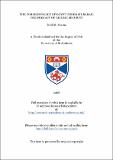Files in this item
The foreign policy of Egypt under Mubarak : the primacy of regime security
Item metadata
| dc.contributor.advisor | Hinnebusch, Raymond A. | |
| dc.contributor.author | Shama, Nael M. | |
| dc.coverage.spatial | 302 | en |
| dc.date.accessioned | 2008-12-02T16:18:20Z | |
| dc.date.available | 2008-12-02T16:18:20Z | |
| dc.date.issued | 2008-06 | |
| dc.identifier.uri | https://hdl.handle.net/10023/569 | |
| dc.description.abstract | The study explores Egypt’s foreign policy under President Hosni Mubarak. It focuses on the way Mubarak's regime dealt with internal and external threats to maintain security and bolster his internal hold on power. Two case studies are chosen to test the hypotheses: Egypt’s reluctance to reestablish diplomatic ties with the Islamic Republic of Iran and Egypt’s response to the Greater Middle East Initiative proposed by the Bush administration and the series of Western efforts aimed at promoting political reform in the Middle East, in particular the measures it took to warm up its relations with Israel, including the signing of the QIZ treaty. The following arguments are made: 1- Security is central in understanding the behavior of Third World states. 2- The traditional 'balance of power' model should be substituted with the 'balance of threat' theory. 3- Faced with a combination of internal and external threats, Third World states most often tend to 'omnibalance' between both sets. 4- Foreign policy decisions in the Third World are determined by the level of internal and external threats, the availability of regional and international allies and the idiosyncrasies of leaders, their type of legitimacy and the interests of their ruling coalitions. 5- The foreign policies of Third World states, which tend to be lacking in strong institutions, democracy or national consensus and facing threats from within as well as without, are less likely to be shaped by or serve a national interest than a regime interest. | en |
| dc.format.extent | 2675 bytes | |
| dc.format.mimetype | application/pdf | |
| dc.language.iso | en | en |
| dc.publisher | University of St Andrews | |
| dc.subject | Egypt | en |
| dc.subject | Foreign policy | en |
| dc.subject | Hosni Mubarak | en |
| dc.subject | Security | en |
| dc.subject.lcc | DT107.87S5 | |
| dc.subject.lcsh | Egypt--Foreign relations--1981- | en |
| dc.subject.lcsh | Security, International--Egypt | en |
| dc.subject.lcsh | Egypt--Politics and government--1981- | en |
| dc.subject.lcsh | Developing countries--Foreign relations | en |
| dc.title | The foreign policy of Egypt under Mubarak : the primacy of regime security | en |
| dc.type | Thesis | en |
| dc.type.qualificationlevel | Doctoral | en |
| dc.type.qualificationname | PhD Doctor of Philosophy | en |
| dc.publisher.institution | The University of St Andrews | en |
This item appears in the following Collection(s)
Items in the St Andrews Research Repository are protected by copyright, with all rights reserved, unless otherwise indicated.

